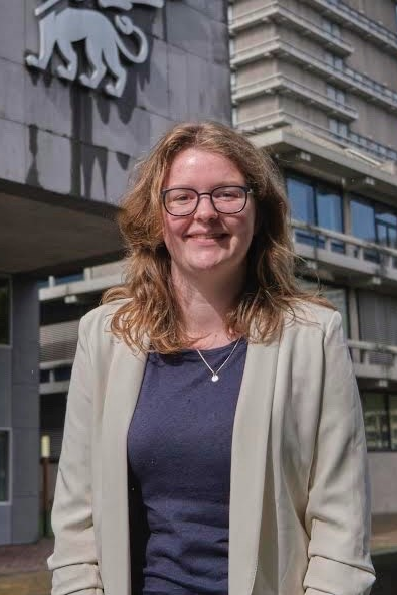Small-scale
Merel had known for some time that she was interested in law, but a traditional law degree did not appeal to her that much. ‘Traditional law programmes operate on quite a large scale, with lots of students and working groups.’The small-scale nature of Law in Society suited her better. The selection process was another big draw for her. ‘I was attracted by the idea of sharing a lecture hall with like-minded people who have the same interests and motivation as I do.’
Multidisciplinary
The multidisciplinary nature of the programme also appealed to her. ‘I like the fact that you not only study law, but also follow subjects like criminology and psychology. This allows you to develop a much broader perspective.’Merel says that Law in Society was the answer to her ‘problem’ of having a broad range of interests. ‘LiS is an interdisciplinary programme, but with a clear focus in the sense that you are trained as a lawyer. Alternatively, you can become a public prosecutor or judge in the Netherlands if you take the additional programme ‘Civiel Effect’ before or after graduating. That way, you don’t have to follow a traditional law programme and can still pursue a career in the judiciary.’
Civiel Effect
For Merel, combining the LiS programme with obtaining ‘Civiel Effect’ proved to be the best solution. ‘I didn't want to rule out the option of a career in the judiciary just yet, but I also wanted to follow a degree programme that would give me satisfaction.’Merel therefore decided to take the supplementary programme ‘Civiel Effect’ after completing her Bachelor’s degree in Law in Society. ‘If you want to work in the judiciary, you need to meet a number of requirements set by the legal profession. As LiS is an interdisciplinary programme, you don’t take all the law courses you need to pursue a career in the judiciary. You can still pass those courses by completing the ‘Civiel Effect’ programme while working towards or after obtaining a Bachelor’s degree in Law in Society. In formal terms, it provides you with the same basis as students who have taken a classical law programme, with the difference that you have an additional Bachelor’s degree that gives you a much broader perspective than law, whether Dutch law or another aspect or field, alone.’
Despite ‘Civiel Effect’ being a challenging programme, it was the right fit for Merel. ‘For me it’s a good solution, since I don’t think I would have enjoyed studying for a more traditional law degree as much. It has allowed me to take all the necessary law courses in one year as part of the ‘Civiel Effect’ programme. Besides, I like a challenge.’
The future
Merel plans to do a Master’s after completing her Bachelor’s programme. She has not decided on a specific job yet. ‘I don’t yet know exactly what I will do after my Master’s, although I’d like to use my knowledge and skills to make a difference for people who are less privileged than I am. I’d like to work for the government, at a municipality or a ministry. But I also really enjoy doing research, so I wouldn’t rule out a more legal research-oriented role such as a staff lawyer at the District Court or the Supreme Court either.’
